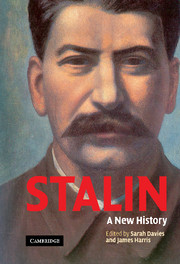Book contents
- Frontmatter
- Contents
- Notes on contributors
- Preface
- A note on transliteration
- Glossary
- 1 Joseph Stalin: power and ideas
- 2 Stalin as Georgian: the formative years
- 3 Stalin as Commissar for Nationality Affairs, 1918–1922
- 4 Stalin as General Secretary: the appointments process and the nature of Stalin's power
- 5 Stalin as Prime Minister: power and the Politburo
- 6 Stalin as dictator: the personalisation of power
- 7 Stalin as economic policy-maker: Soviet agriculture, 1931–1936
- 8 Stalin as foreign policy-maker: avoiding war, 1927–1953
- 9 Stalin as Marxist: the Western roots of Stalin's russification of Marxism
- 10 Stalin as Bolshevik romantic: ideology and mobilisation, 1917–1939
- 11 Stalin as patron of cinema: creating Soviet mass culture, 1932–1936
- 12 Stalin as producer: the Moscow show trials and the construction of mortal threats
- 13 Stalin as symbol: a case study of the personality cult and its construction
- 14 Stalin as the coryphaeus of science: ideology and knowledge in the post-war years
- Index
14 - Stalin as the coryphaeus of science: ideology and knowledge in the post-war years
Published online by Cambridge University Press: 24 November 2009
- Frontmatter
- Contents
- Notes on contributors
- Preface
- A note on transliteration
- Glossary
- 1 Joseph Stalin: power and ideas
- 2 Stalin as Georgian: the formative years
- 3 Stalin as Commissar for Nationality Affairs, 1918–1922
- 4 Stalin as General Secretary: the appointments process and the nature of Stalin's power
- 5 Stalin as Prime Minister: power and the Politburo
- 6 Stalin as dictator: the personalisation of power
- 7 Stalin as economic policy-maker: Soviet agriculture, 1931–1936
- 8 Stalin as foreign policy-maker: avoiding war, 1927–1953
- 9 Stalin as Marxist: the Western roots of Stalin's russification of Marxism
- 10 Stalin as Bolshevik romantic: ideology and mobilisation, 1917–1939
- 11 Stalin as patron of cinema: creating Soviet mass culture, 1932–1936
- 12 Stalin as producer: the Moscow show trials and the construction of mortal threats
- 13 Stalin as symbol: a case study of the personality cult and its construction
- 14 Stalin as the coryphaeus of science: ideology and knowledge in the post-war years
- Index
Summary
In late December 1946 Joseph Stalin convened a meeting of high-level Communist Party personnel at his office in the Kremlin. The opening salvos of the Cold War had already been launched. Disagreements about the political future of Germany, disputes over the presence of Soviet troops in Iran, and conflicts over proposals to control atomic weapons had all contributed to growing tensions between the USA and USSR. Inside the Soviet Union, the devastating effects of the Second World War were painfully obvious: cities remained bombed out and unreconstructed; famine had laid waste to the countryside, with millions dying of starvation and many millions more malnourished. All this makes the agenda for the Kremlin meeting surprising: Stalin wanted to discuss a book on the history of Western European philosophy.
It is certainly rare for the leader of a powerful country to take the time amidst international and domestic crises to discuss something so decidedly academic as a philosophy book. But for Stalin, no subject was beyond politics. Or, to put it another way, Marxism-Leninism did not merely define a political system or an economic interpretation of history, it constituted an all-encompassing worldview. Stalin's attention to scholarship was remarkable during his last years, when the Soviet press added the ‘coryphaeus of science’ to his growing list of epithets.
- Type
- Chapter
- Information
- StalinA New History, pp. 271 - 288Publisher: Cambridge University PressPrint publication year: 2005
- 1
- Cited by



